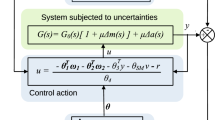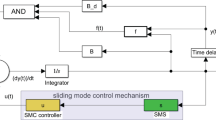Abstract
In this paper, we consider the relation between the switching dwell time and the stabilization of switched linear control systems. First of all, a concept of critical dwell time is given for switched linear systems without control inputs, and the critical dwell time is taken as an arbitrary given positive constant for a switched linear control systems with controllable switching models. Secondly, when a switched linear system has many stabilizable switching models, the problem of stabilization of the overall system is considered. An on-line feedback control is designed such that the overall system is asymptotically stabilizable under switching laws which depend only on those of uncontrollable subsystems of the switching models. Finally, when a switched system is partially controllable (While some switching models are probably unstabilizable), an on-line feedback control and a cyclic switching strategy are designed such that the overall system is asymptotically stabilizable if all switching models of this uncontrollable subsystems are asymptotically stable. In addition, algorithms for designing switching laws and controls are presented.
Similar content being viewed by others
References
D. Liberzon, A. S. Morse. Basic problems in stability and design of switched systems[J]. IEEE Control Systems and Mag., 1999, 19(5): 59–70.
W. P. Dayawansa, C. F. Martin. A converse Lyapunov theorem for a class of dynamical systems which undergo switching[J]. IEEE Trans. on Automatic Control, 1999, 44(4): 751–760.
D. Cheng, L. Guo, J. Huang. On quadratic Lyapunov functions[J]. IEEE Trans. on Automatic Control, 2003, 48(5): 885–890.
D. Cheng. Accessibility of switched linear systems[C] // Proc. of the 42nd IEEE Conf. on Decision and Control. Mauii, 2003, 6: 5759–5764.
D. Cheng. Stabilization of planar switching systems[J]. Systems & Control Letters, 2004, 51(2): 79–88.
J. Ezzine, A. H. Handdad. Controllaiblity and observalbilty of hybrid systems[J]. Int. J. of Control, 1989, 49(6): 2045–2055.
Z. Sun, S. S. Ge, T. Lee. Controllability and reachability criteria for switched linear systems[J]. Automatica, 2002, 38(5): 775–786.
G. Xie, D. Zheng, L. Wang. Controllability of switched linear systems[J]. IEEE Trans. on Automatic Control, 2002, 47(8): 1401–1405.
A. S. More. Supervisory control of families of linear set point controller-part 1: exact mataching[J]. IEEE Trans. on Automatic Control, 1996, 41(10): 1413–1431.
J. P. Hespanha, A. S. Morse. Stability of switched systems with average dwell time[C] // Proc. of the 38th IEEE Conf. on Decision and Control. Phoenix, Arizona USA, 1999, 3: 2655–2660.
G. Zhai, B. Hu, A. N. Michel. Stability analysis of switched systems with stable and unstable subsystems: an Average dwell time approach[J]. Int. J. of Systems Science, 2001, 32(8): 1055–1061.
K. S. Narendra, J. Balakeishnan. A common Lyapunov function for stable LTI systems with commuting A-Matrices[J]. IEEE Trans. on Automatic Control, 1994, 39(12): 2469–2471.
D. Liberzon, J.P. Hespanha, and A.S. Morse. Stability of switched systems: a Lie algebraic condition.[J]. Systems & Control Letters, 1999, 37(3): 117–122.
D. Cheng, L. Guo. Y. Lin, Y. Wang. Stabilization of switched linear systems[J]. IEEE Trans. on Automatic Control, 2005, 50(5): 661–666.
J. Zhao, G. M. Dimirovski. Quadratic stability of a class of switched nonlinear systems[J]. IEEE Trans. on Automatic Control, 2004, 49(4): 574–578.
D. Cheng, L. Guo, Y. Lin, Y. Wang. A note on overshoot estimattion in pole placements[J]. J. of Control Theory and Applications, 2004, 2(2): 161–164.
L. Zhang, D. Cheng, J. Liu. Stabilization of switched linear systems[J]. Asian J. of Control, 2003, 5(4): 476–483.
Author information
Authors and Affiliations
Additional information
This work was supported by the National Natural Science Foundation of China(No.60343001, 60221301) and the Foundation of Harbin Engineering University.
Lijun Zhang received the M.S. degree from Shaanxi Normal University in 1997, and the Ph.D. degree from Institute of Systems Science, Chinese Academy of Sciences, Beijing China in 2003. Since 2005, he is a Professor at the Harbin Engineering 470 University, China. His research interests include nonlinear system and control, switched systems control, etc. He is the author/co-author of 20 journal papers.
Chunwen Li graduated from Tsinghua University in 1982, also received the Ph.D. degree from Tsinghua University in 1989. Since 1996, he is a Professor working in Tsinghua University. His research interests include nonlinear systems and control, quantum control etc. He is the author/co-author of 50 papers.
Rights and permissions
About this article
Cite this article
Zhang, L., Li, C. Critical dwell time of switched linear systems. J. Control Theory Appl. 4, 402–408 (2006). https://doi.org/10.1007/s11768-006-5019-1
Received:
Revised:
Issue Date:
DOI: https://doi.org/10.1007/s11768-006-5019-1




